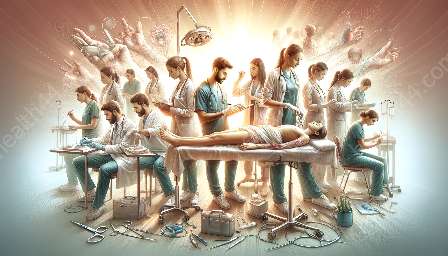Medical history taking is an essential aspect of patient care that plays a pivotal role in clinical skills training and health education. It involves gathering comprehensive information about a patient’s past and current medical conditions, as well as their social, family, and personal history. This process is crucial for diagnosing illnesses, formulating treatment plans, and providing holistic healthcare delivery.
The Importance of Medical History Taking
Effective medical history taking is foundational to the practice of medicine. It serves as the cornerstone for establishing a strong doctor-patient relationship, fostering trust and understanding. By delving into a patient’s medical history, healthcare professionals can gain valuable insights into their health status, potential risk factors, and underlying causes of disease. This information enables tailored treatment approaches, promotes preventive care, and contributes to improved patient outcomes.
Key Components of Medical History Taking
Medical history taking involves a systematic approach to gathering information across various domains. The essential components include:
- Chief Complaint: Identifying the primary reason for the patient's visit and understanding their symptoms.
- Present Illness: Documenting the detailed progression of the current illness or medical concern.
- Medical History: Collecting comprehensive information about past medical conditions, surgeries, hospitalizations, and medication use.
- Family History: Inquiring about the presence of specific diseases or health conditions in the patient's family members.
- Social History: Exploring the patient's lifestyle, habits, occupation, and social support system.
- Personal History: Understanding the patient's past experiences, including obstetric and gynecologic history for female patients.
- Review of Systems: Systematically examining various organ systems to identify any additional symptoms or potential health issues.
Skills for Effective Medical History Taking
Developing proficient medical history taking skills is essential for healthcare professionals. It requires a combination of clinical expertise, communication abilities, and interpersonal skills. Some key skills and techniques that facilitate effective history taking include:
- Active Listening: Paying full attention to the patient's narrative and allowing them to express their concerns without interruption.
- Empathy and Compassion: Demonstrating understanding and respect for the patient's perspective, feelings, and concerns.
- Effective Questioning: Asking open-ended and specific questions to elicit relevant medical information while being mindful of cultural sensitivities.
- Building Rapport: Creating a supportive and non-judgmental environment to encourage patient trust and openness.
- Non-Verbal Communication: Observing the patient's body language, gestures, and emotional cues to comprehend their unspoken communication.
Integration with Clinical Skills Training
Integrating medical history taking into clinical skills training enhances the competency of future healthcare professionals. By emphasizing the significance of comprehensive patient interviews and history collection, educators can instill the foundational principles of patient-centered care, critical thinking, and diagnostic reasoning. Simulation-based training scenarios and experiential learning activities can further refine students' history taking abilities in a controlled educational environment.
Health Education and Medical Training
Medical history taking serves as a fundamental component of health education and medical training. Educators can incorporate interactive case studies, role-play exercises, and standardized patient encounters to hone students' history-taking skills. By emphasizing the interplay between physical examination findings, patient history, and diagnostic reasoning, educators can prepare future healthcare professionals for real-world clinical practice.
Conclusion
Medical history taking is an art that intertwines the science and compassion of medicine. It forms the bedrock of patient care, clinical decision-making, and healthcare outcomes. Embracing the art of medical history taking through integrated clinical skills training and health education is pivotal for shaping competent and empathetic healthcare providers who can effectively navigate the complexities of patient care.



